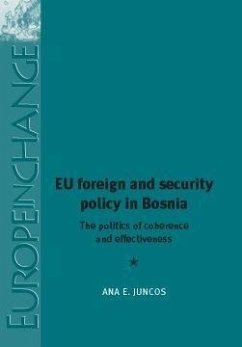There is broad agreement among scholars that the EU's intervention in Bosnia is both a challenge to and a testing ground for the EU's foreign and security policy, particularly, its civilian and crisis management operations. Despite the pervasiveness of commentary on this issue, few scholars have addressed it in a systematic and empirical fashion. This book represents the first ever comprehensive study of the EU's foreign and security policy in Bosnia since the dissolution of the Yugoslav Federation in 1991. This book draws on historical institutionalism to explain the EU's contribution to post-conflict stabilisation and conflict resolution in Bosnia. Drawing on a wealth of fresh empirical material, the book demonstrates that institutions are a key variable in explaining levels of CFSP coherence and effectiveness and that institutional legacies and unintended consequences have shaped CFSP impact over time. In doing so, it also sheds new light on the role that intergovernmental, bureaucratic and local political contestation have played in the formulation and implementation of a European foreign and security policy. The study concludes that the EU's involvement in Bosnia has not only had a significant impact on this Balkan country in its path from stabilisation to integration, but has also transformed the EU, its foreign and security policy and shaped the development of the EU's international identity along the way. The book will be of great interest to researchers and students of EU politics, International Relations and Bosnian politics.








